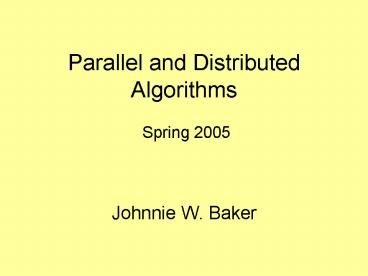Parallel and Distributed Algorithms Spring 2005 PowerPoint PPT Presentation
Title: Parallel and Distributed Algorithms Spring 2005
1
Parallel and Distributed Algorithms Spring 2005
- Johnnie W. Baker
2
Presentations
- Professor Johnnie W. Baker
- Instructor
- Will give most presentations
- Guest Lecturers from Parallel Processing Group
- Occasional lecture in areas of expertise
- Occasionally cover classes when I am away
- Hopefully, we will have a grader from this group.
3
Two Primary Textbooks
- Parallel Programming in C with MPI and OpenMP
- Michael Quinn, author
- Published by McGraw Hill in 2004
- Used in both PDC and PDA
- Parallel Computation Models and Methods
- Selim Akl, author
- Prentice Hall, 1997
- Access to an online copy will be provided.
- There will also be some supplementary handouts.
4
Additional References
- There will also be some supplementary handouts
provided, as needed. - Another excellent reference (not required) for
parts of the PDA course is - Introduction to Parallel Computing (Second
Edition) - Authors are Grama, Gupta, Karypis, Kumar
- Addison Wesley, 2003.
- A more advanced reference for some topics in
Quinn - A useful online textbook (more applicable to PDC)
is - Designing and Building Parallel Programs
- Ian Foster, Addison Wesley, 1995
- The website for this book is http//www-unix.mcs.a
nl.gov/dbpp/
5
Two Complementary Courses
- Parallel Distributed Computing (Fall)
- Parallel Architectures
- Parallel Languages
- Parallel Programming
- Algorithm Examples for some architectures
- Parallel Distributed Algorithms (Spring)
- Important Models of Computation
- Designing Efficient Algorithms for Various Models
- PDC and PDA can be taken in either order
- More natural for PDC to be taken first
- However, students often take PDA first
6
Limited Overlap in PDC PDA
- Allows PDC and PDA to be taken in either order.
- Performance Evaluation and Limits for Parallel
Computation - Some general topics required for both courses.
- More practical coverage needed for programming in
PDC - More theoretical considerations in PDA
- MPI Language
- Covered as a programming language in PDC
- Only a subset used in algorithms covered in PDA
- No programming assignments in PDA
7
Prerequisites
- The prerequisite for this course is
- A course in the design and analysis of algorithms
such as CS 4/56101. - Or Permission
- Alternately, students who have the following
course should also have an adequate background
for this course. - CS 6/76105 Parallel and Distributed Computing
8
Assignments and Grading
- Homework assignments
- Problems assigned for most chapters
- Probably 5-7 different assignments
- No programming assignments
- Course Grade
- Based on homework, midterm, and final
- Approximate weights (assuming grader)
- Homework 40
- Midterm Exam 30
- Final Exam 30
9
Major Topics Covered in PDA(Not necessarily in
order covered)
- General topics
- Analysis of parallel computation
- Limits for parallel computation
- PRAM model and algorithms
- Algorithms for some important interconnection
networks - e.g. linear arrays, 2D mesh, hypercube
- Bus-Based models and typical algorithms
- Task/Channel Model algorithms (using MPI)
- BSP (Bulk Synchronous Model) and algorithms
- KSUs associative model and algorithms
10
Major Topics in Companion Course (PDC)
- Fundamental concepts in parallel computation.
- Synchronous Computation
- SIMD, Vector, Pipeline Computing
- Associative and Multi-Associative Computing
- ASC Language and Programming
- MultiC Language and Programming
- Fortran 90 and HPF Languages
- Asynchronous (MIMD) Shared Memory Computation
- OpenMP language
- Symmetric Multiprocessors or SMPs
- Asynchronous (MIMD) Distributed Memory
Computation - Communications
- MPI Language and Programming
- Architectures
- Interconnection Networks (synchronous and
asynchronous) - Specific Computer Examples for above computation
paradigms - MIMD-SIMD Comparisons in Real-Time Applications

